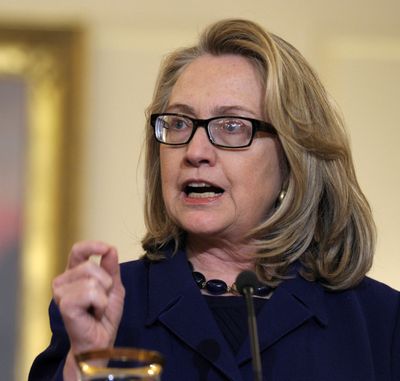One American dead in Algeria
Details of attack on gas plant, rescue try emerge from abroad

CAIRO – At least one American died and an unknown number of other foreigners remain unaccounted for Friday as details began to emerge of this week’s assault by Islamist militants on a natural gas production complex in eastern Algeria.
The U.S. State Department, which had maintained a stony silence about what it had been told about the Islamist assault and an Algerian army rescue attempt the next day, acknowledged late Friday that an American, Frederick Buttaccio, had died. But its brief statement, released shortly after 7 p.m., did not say whether he had been killed by the Islamists or in the Algerian rescue effort and did not provide his hometown.
“We express our deepest condolences to his family and friends,” the statement said. “Out of respect for the family’s privacy, we have no further comment.”
The U.S. acknowledgement that one American had died came as other world leaders offered detailed accounts of what they’d been told by Algerian authorities. Survivors also provided descriptions of the ordeal that began when the al Qaida-linked extremists swept through the In Amenas natural gas complex in eastern Algeria in the early hours of Wednesday. The Algerian rescue effort came the next day.
One survivor described how he hid for 40 hours underneath a bed until Algerian troops arrived. Another told how he saw four vehicles loaded with hostages obliterated by Algerian army fire during the rescue. But other survivors said the Algerian attack allowed hundreds to escape.
One of the most detailed accounts came from British Prime Minister David Cameron, who told Parliament that the initial Islamist attack was a “large, well-coordinated and heavily armed assault” on the compound’s residential complex and its work areas.
In all, he said, the number of British involved was “significantly less than 30,” and one was killed during the initial assault.
In France, Foreign Minister Laurent Fabius said shortly after getting word from Algeria that a French national was among the dead.
Other nations were equally forthcoming about what they knew had taken place. In the initial hours after the attack, Norway, Ireland and Japan identified how many of their citizens were missing; a day later, Japan, Norway and Great Britain acknowledged that the Algerians did not tell them in advance that they were about to launch a ground and air offensive to rescue the hostages.
That stood in marked contrast to the Obama administration’s refusal throughout much of the day to provide information about what it knew about what had taken place.
At her last news conference as secretary of state, Hillary Rodham Clinton limited her remarks to saying that the U.S. is “deeply concerned about those who remain in danger,” without saying how many of them were Americans. Victoria Nuland, the State Department spokeswoman, turned away questions from reporters. “I don’t have any information to share on the current ground situation right now,” she said.
There was no explanation offered for the U.S. reticence to provide the kind of information on the Algerian events that seemed to be flowing from other world capitals, but it comes at a time when the Obama administration is still facing questions about what it had said publicly in the days after the Sept. 11 killing of Christopher Stevens, the U.S. ambassador to Libya, and three other Americans when Islamists attacked U.S. diplomatic compounds in Benghazi, Libya. Clinton is scheduled to testify about the matter before Congress next week.
American officials also might be hesitant about demands, reported Friday by Mauritania’s ANI news agency, that the Islamists were seeking the release of two people convicted in U.S. federal court of terrorist attacks: Sheikh Omar Abdel-Rahman, the so-called “blind sheikh” who is serving a life term in connection with the 1993 bombing of the World Trade Center, and Aafia Siddiqui, a U.S.-trained Pakistani neuroscientist who was convicted of trying to kill her American interrogators in Afghanistan.